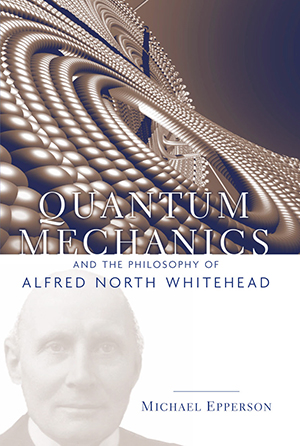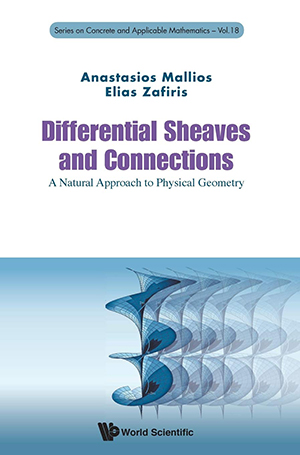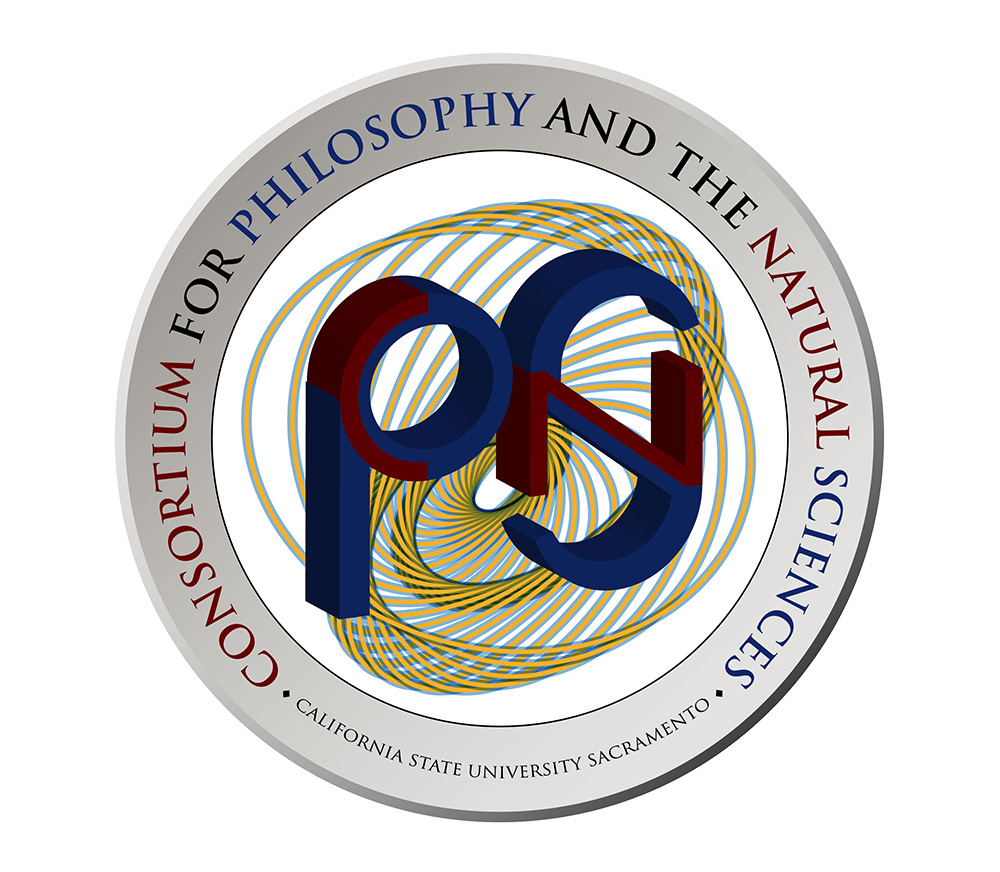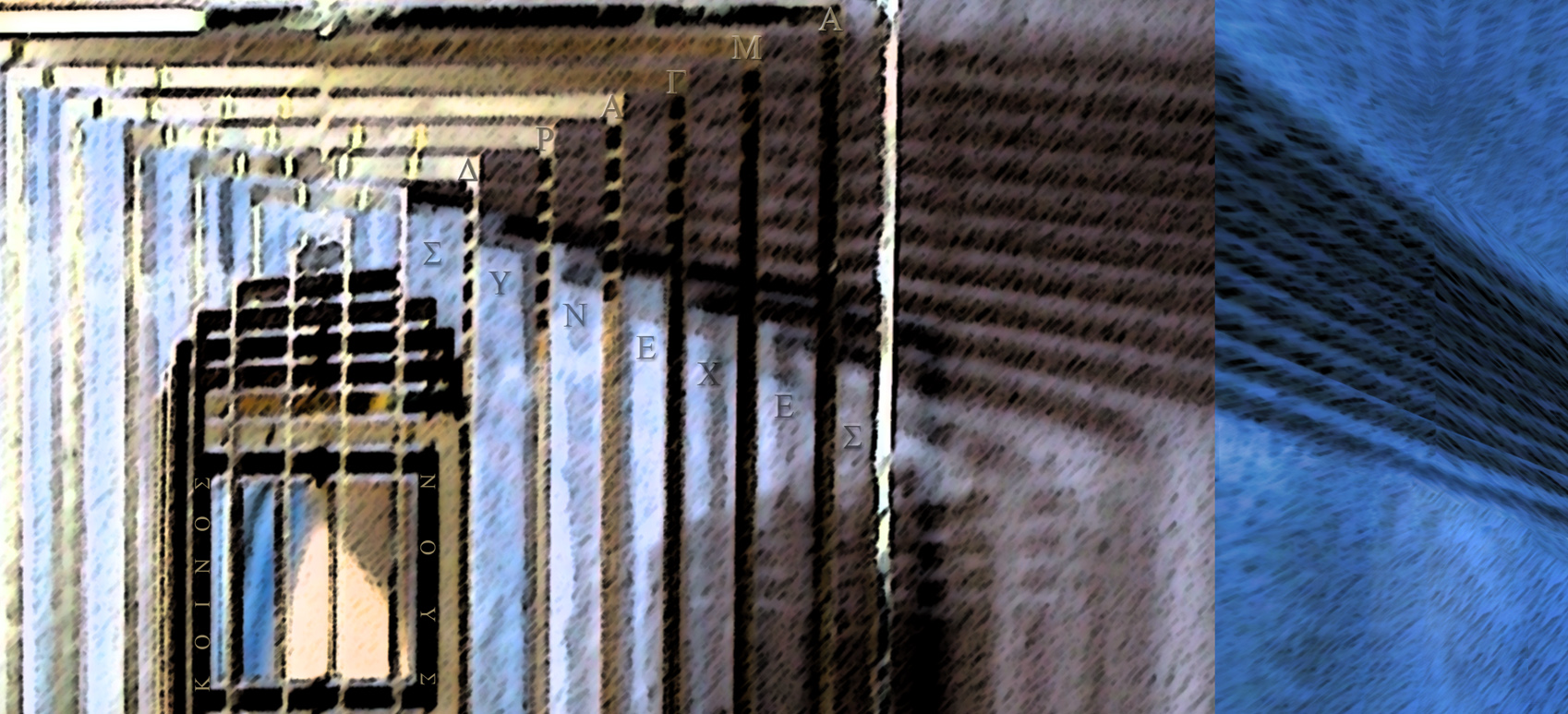A PHYSICIST FROM IMPERIAL COLLEGE AND A PHILOSOPHER FROM THE UNIVERSITY OF CHICAGO TEAM UP TO BRING THE 'SPOOKY' QUANTUM WORLD BACK DOWN TO EARTH
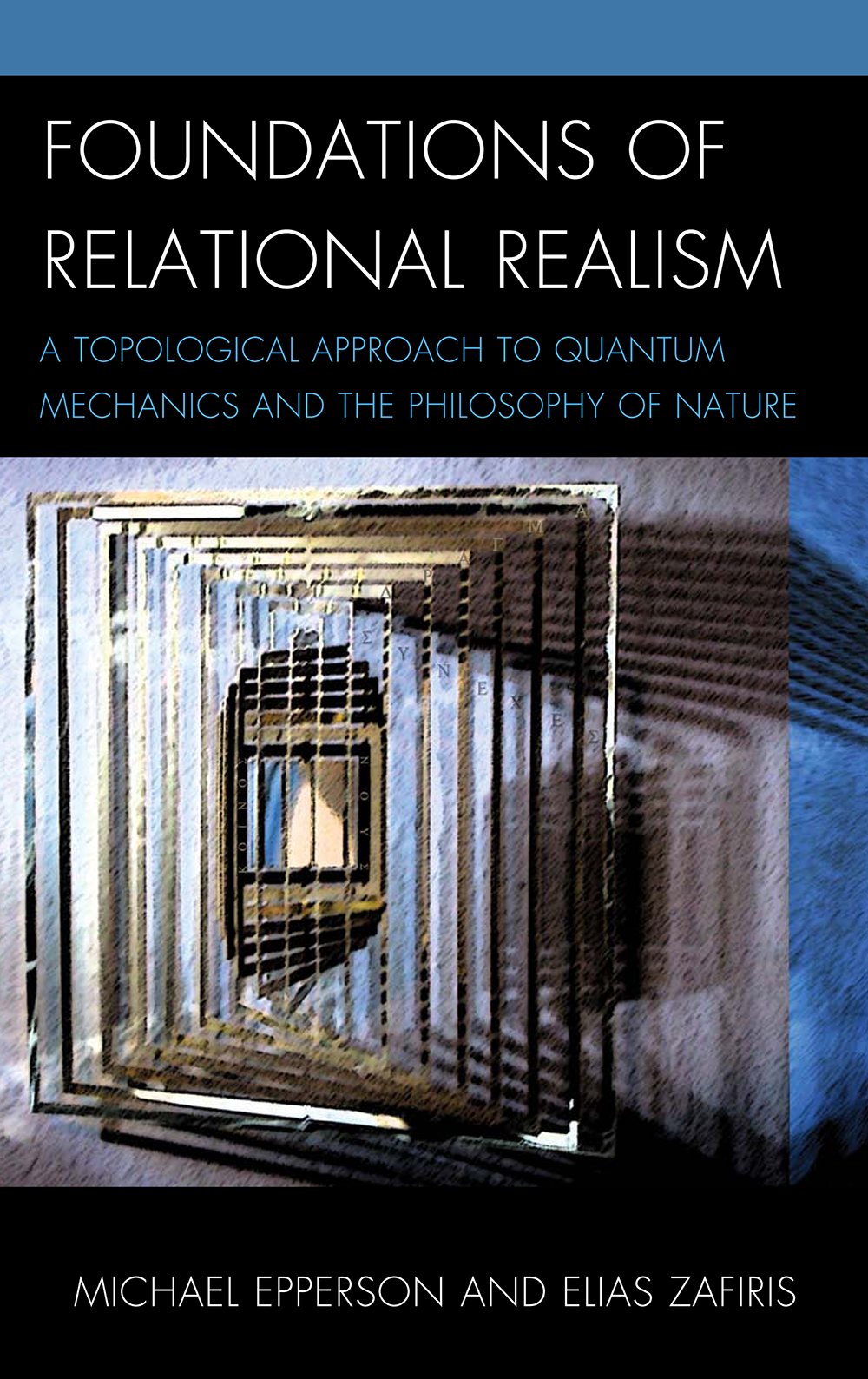
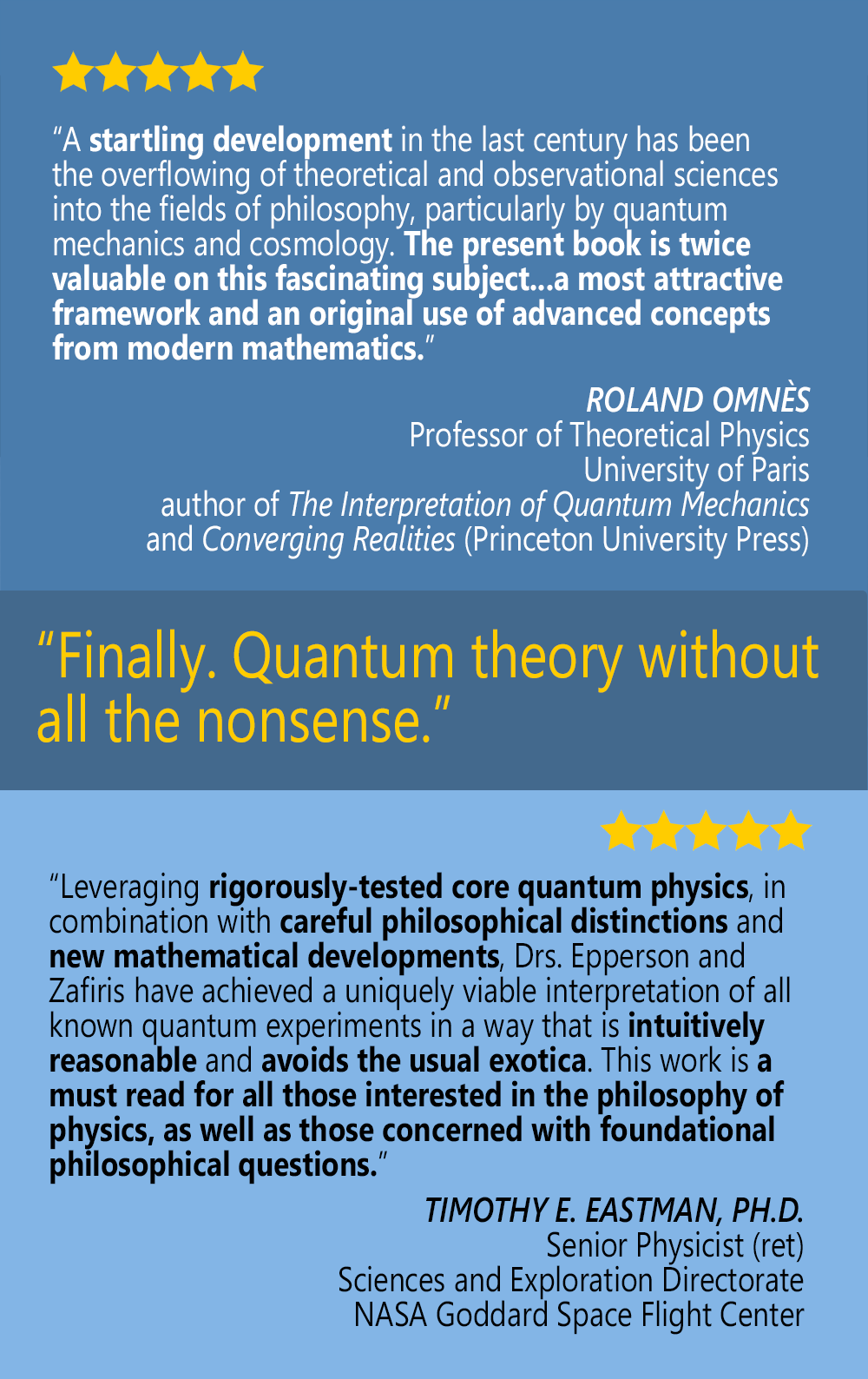

-

PUBLISHED BY ROWMAN & LITTLEFIELD. AVAILABLE IN HARDCOVER, PAPERBACK, AND EBOOK
For a list of the authors' related peer-reviewed journal articles and invited university talks, please visit the Consortium for Philosophy and the Natural Sciences.
-
reviews
“Recommended reading for graduate students and researchers/faculty. One of the driving contentions in modern physics has been the inability to reconcile the dominance of classical thought in the theory of relativity with the indeterminate nature of quantum mechanics. Here, Epperson and Zafiris decide to return to ordinary quantum mechanics and propose sheaf theory, a theory that grew out of the abstract algebra of topology and set theory, as a solution to the stubborn paradoxes found in quantization attempts. They then compare the theory's interpretive value to the category scheme found in Whitehead's Process and Reality (1929). Epperson's earlier work, Quantum Mechanics and the Philosophy of Alfred North Whitehead (2004), is a good predecessor to the current book.”
CHOICE
"This is a unique book in its scope, approach and method. A novel physical and philosophical interpretation of sheaf theory sheds new light on the quantum measurement problem, entanglement, locality and truth. A new systematic and rigorous relational realistic paradigm for natural philosophy has emerged, rooted on the same principles with Abstract (Modern) Differential Geometry, that transmutes the above into a fully fledged dynamical theory."
ANASTASIOS MALLIOS
Professor Emeritus of Mathematics
Department of Mathematics
University of Athens
Author of Geometry of Vector Sheaves (Springer) and
Modern Differential Geometry in Gauge Theories (Birkhäuser)
"A startling development in the last century has been the overflowing of theoretical and observational sciences into the fields of philosophy, particularly by quantum mechanics and cosmology. The present book is twice valuable on this fascinating subject in my opinion: on one hand for its clear and lucid exposition and application of Whitehead's ontology as a most attractive framework for this kind of query, and on the other hand, for its extension of the dialectics of ontology through an original use of advanced concepts from modern mathematics."
ROLAND OMNÈS
Professor Emeritus of Theoretical Physics
University of Paris
Author of The Interpretation of Quantum Mechanics and
Converging Realities (both Princeton University Press)
“Leveraging rigorously-tested core quantum physics, in combination with careful philosophical distinctions and new mathematical developments (topology and category theory), Drs. Epperson and Zafiris have achieved a uniquely viable interpretation of all known quantum experiments (including many rigorously-checked Bell inequality tests) in a way that is intuitively reasonable and avoids the usual exotica. In addition, their predictions on non-local quantum correlations associated with global topological phases have been confirmed in recent experiments. Epperson provides very readable yet in-depth philosophical and interpretive foundations (210 pages) followed by Zafiris' rigorous treatment of mathematical foundations (177 pages). This work is a must read for all those interested in the philosophy of physics, as well as those concerned with foundational philosophical questions.”
TIMOTHY E. EASTMAN, PH.D.
Senior Physicist (ret.)
Sciences and Exploration Directorate
NASA Goddard Space Flight Center -
about the book
Among the many exotic interpretations of quantum theory—those entailing ‘multiverse’ cosmologies, 'time reversal,' ‘retro-causality,’ and physical superpositions of alternative actual system states—lies a single core principle: That quantum theory’s most emblematic feature is its invalidation of classical logic—the very foundation of intuitive, critical reasoning—at the level of fundamental physics. As a result, quantum mechanics has become widely popularized, and in many cases, marketed, as mystifying and essentially incomprehensible to non-specialists.
Yet at the heart of this popularization lies a paradox: The rules of classical logic purportedly invalidated by quantum mechanics are, at the same time, necessarily presupposed by quantum mechanics; indeed, they are the very rules used to formalize quantum mechanics in the first place.
In Foundations of Relational Realism: A Topological Approach to Quantum Mechanics and the Philosophy of Nature, Michael Epperson and Elias Zafiris provide a powerful new solution to this paradox by upgrading quantum theory’s presupposed set theoretic, metrical structure, grounded in object elements, to a category theoretic, topological structure grounded in object relations. To this end, the book presents a novel, intuitive interpretation of quantum mechanics, based on a revised decoherent histories interpretation, structured within a category theoretic topological formalism.
"In quantum mechanics, the conventional notion of a history as ‘a story about fundamental objects’ is reversed, such that the classical ‘objects’ become the story by which we understand physical systems that are fundamentally histories of quantum events." In this unique two-part volume, designed to be comprehensible to both specialists and non-specialists, the authors chart out a pathway forward by identifying the central deficiency in most interpretations of quantum mechanics, and indeed, in modern philosophy more generally: That in the conventional, metrical depiction of extension, inherited from the Enlightenment, objects are characterized as fundamental to relations—i.e., such that relations presuppose objects but objects do not presuppose relations. The authors, by contrast, argue that in quantum mechanics physical extensiveness fundamentally entails not only relations of objects, but also relations of relations. In this way, quantum mechanics exemplifies a concept of extensive connection that it is fundamentally topological rather than metrical, and thus requires a logico-mathematical framework grounded in category theory rather than set theory.
By this thesis, the fundamental quanta of quantum physics are properly defined as units of logico-physical relation rather than merely units of physical relata as is the current convention. Objects are always understood as relata, and likewise relations are always understood objectively. Objects and relations are thus coherently defined as mutually implicative. The conventional notion of a history as ‘a story about fundamental objects’ is thereby reversed, such that the classical ‘objects’ become the story by which we understand physical systems that are fundamentally histories of quantum events. These are just a few of the novel critical claims explored in this volume—claims whose exemplification in quantum mechanics will, the authors argue, serve more broadly as foundational principles for the philosophy of nature as it evolves through the 21st century and beyond.

